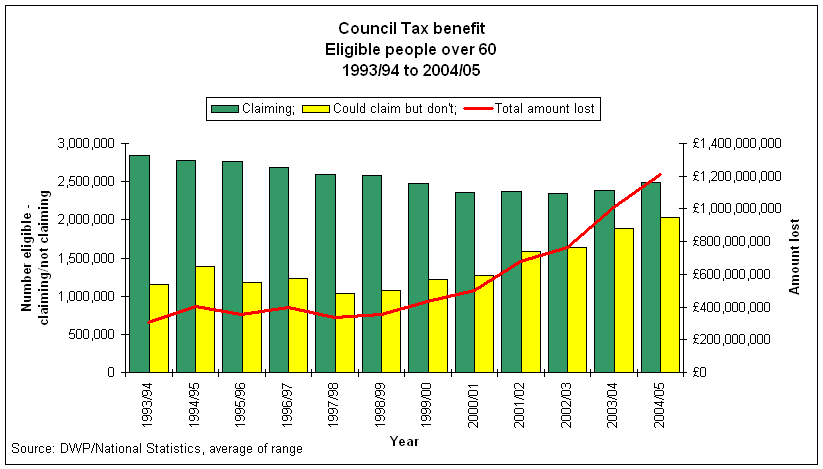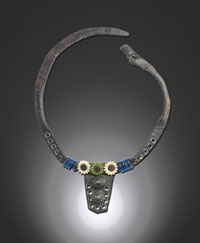
Every year more people over 60 can get help from the Government with their council tax, their general living expenses or, if they are tenants, their rent. And every year, despite some genuine attempts by the Government to get the money to them, more fail to claim it. Take that most hated imposition – council tax. Around half of those over 60 could get money off it. But the latest figures show that more than two million who could get this discount do not and lose out on well over a billion pounds towards their council tax. The failure of council tax benefit to get help to people over 60 can be plotted right back to the start of council tax.

In that year, 1993/94, seven out of ten who were eligible for help with their council tax claimed it. But by 2004/05 that had fallen to barely half. As the yellow bars on the graph show, every year from 1997/98 the number who could claim but don’t has grown. In 1993/94 the total amount lost by them was £305 million. That latest figures show that the money lost has almost quadrupled to £1,210 million.
Figures for those claiming help with their income through pension credit or with rent through housing benefit are no better. The latest show that in 2004/05 between £3 billion and £4 billion in total was left languishing in Gordon Brown’s coffers because people over 60 did not claim the money they could get. The number who can claim will rise again from 9 April. Find out if you are one of them by calling 0800 99 1234. You may also have to contact your local council. Or check online at www.entitledto.com or check out Paul Lewis’s guide to council tax www.saga.co.uk/magazine/money
Taxing pastime
The Revenue is warning people who make money buying and selling things
online, for example with the auction site eBay, that they may have to pay tax on
their profits. According to eBay some 15 million people in the UK are registered
users and about 48,000 make a substantial part of their living from it. But as
that hobby grows into a business it is easy to forget that tax may be due. The
same rules apply to anyone who buys and sells for a profit – whether it’s
through car boot sales or the local paper.
If you are just disposing of your own things or unwanted Christmas presents then you are not a trader and need not worry. But if you buy things in order to sell them or you make items specifically to sell, then you are trading and tax may be due. It does not matter how little you make from trading you still have to tell the Revenue and may have to pay tax.
Step 1 is to register as self-employed. If you do not do that within three months of starting to trade there is a penalty of £100. Step 2 is to consider if you have pay National Insurance. Class 2 contributions are £2.20 a week. But you do not have to pay them if you are over pension age (65 for a man or 60 for a woman) or you earn less than £4635 a year from your trading. Step 3 you will be sent a self-assessment tax return and will have to fill it in and pay any tax that is due. More at www.hmrc.gov.uk/findout/index.htm.
Free in Wales
Everyone in Wales will get free prescriptions from April this year.
Prescription charges had already been cut to £3 – less than half what they cost
in the rest of the UK – and made free for those under 25 and, of course, over
60. But now the Welsh Assembly Government has decided to scrap them altogether
from April 1st. The rule applies to people living in Wales who go to a welsh
pharmacist and have a welsh doctor. Welsh residents who have a doctor over the
border in England will be able to get prescriptions free but will need an
entitlement card. In the rest of the UK prescriptions are already free for those
aged 60 or more, students under 19, pregnant women or new mothers and those with
certain long term illnesses. There are no plans to make all prescriptions free
in England but the Scottish Executive is considering changes.
Money to give up pension
If your employer offers you money to leave your company pension scheme it is
probably a bad idea to accept. That was the message from the Pensions Regulator
on the same day the Revenue warned that in future such payments would be taxed
as income. The high cost of providing good company schemes which pay a pension
related to your salary means that some employers are offering employees a cash
bribe to leave. Sometimes that can seem very tempting. But the right to a
pension which is related to your pay and guaranteed for life is very valuable
and it is unlikely that cash now will be enough to pay the full price of giving
up that promise. The Chief Executive of the Pensions regulator, Tony Hobman,
warned that "employers may not break any laws when they offer an inducement,
whether it is cash payments or an increased transfer value, [but] we are
concerned that some transfers are being proposed to avoid an employer's full
pension liability." Anyone made such an offer should take independent financial
advice before accepting it.
End of the cheque?
Most people in the UK have stopped using cheques to shop or pay bills.
Figures from the banking industry indicate that 61 per cent of us never use
cheques for regular expenses. Which is just as well. Many retailers such as Asda,
Boots, Currys, W H Smith and Tesco refuse payments by cheque and so do major
petrol stations such as Shell. Telephone and energy suppliers all prefer to be
paid by direct debit – and offer discounts to those who do. BT recently went a
step further and now charges an extra £4.50 to those who pay their quarterly
bill by cheque. The cheque isn’t quite dead - around five million a day are
still written. But that number has halved since 1990 and the UK Payments
Association APACS expects it to halve again by 2015.
Cash from your home
From April 1st all the ways of releasing cash from your home will
be regulated. Lifetime mortgages have been governed by the Financial Services
Authority since October 2004. And from April Home Reversion schemes join them.
In a separate development all 21 companies in the Safe Home Income Plans
umbrella group have said that from August 1st they will not do
business with financial advisers who have not passed a special qualification in
lifetime mortgages. So far more than 6000 people have qualified. All this should
make releasing money from your home less risky. The Saga Magazine Guide to
Equity release by journalist Jennifer Bailey is on our website www.saga.co.uk/magazine/money.
Pop Profits
We all went to pop concerts in our youth but now those tickets and posters
can be worth money – especially if signed. London auction house Christie’s is
holding a Pop Memorabilia sale this month and Associate Director Sarah Hodgson
says most of the lots will be fresh to the market pulled out of lofts, albums,
drawers and garages.
"They come mainly from people who have had them since the day of the event. One avid Beatles fan followed them round and has a corner of toast eaten by George Harrison!"

That is not for sale. But items from the 1960s are valuable. "A publicity postcard for the Rolling Stones, taken to the concert and signed by all of them will fetch £600 to £700, an album maybe £1000. Anything with Brian Jones on is particularly sought after. And a Please Please Me album signed by all the Beatles would fetch £5000 now."
It is not just the older stars such as Buddy Holly or Bill Haley that collectors want "We have a Kylie Minogue necklace by Dolce & Gabbana with her initial K picked out in diamante which we reckon will fetch up to £1200."
As always with collectibles condition is vital, especially with the less rare items. Demand is growing and for the right item from the right artist prices can be very high.
One record piece was a cheap necklace worn by John Lennon from 1967-68, given to a friend, and sold by him in 2004 for £115,000. Star of the April show will be David Bowie’s costume, worn at the final Ziggy Stardust concert in 1973. It is estimated at £4000 to £6000 but could fetch far more.
April 2007